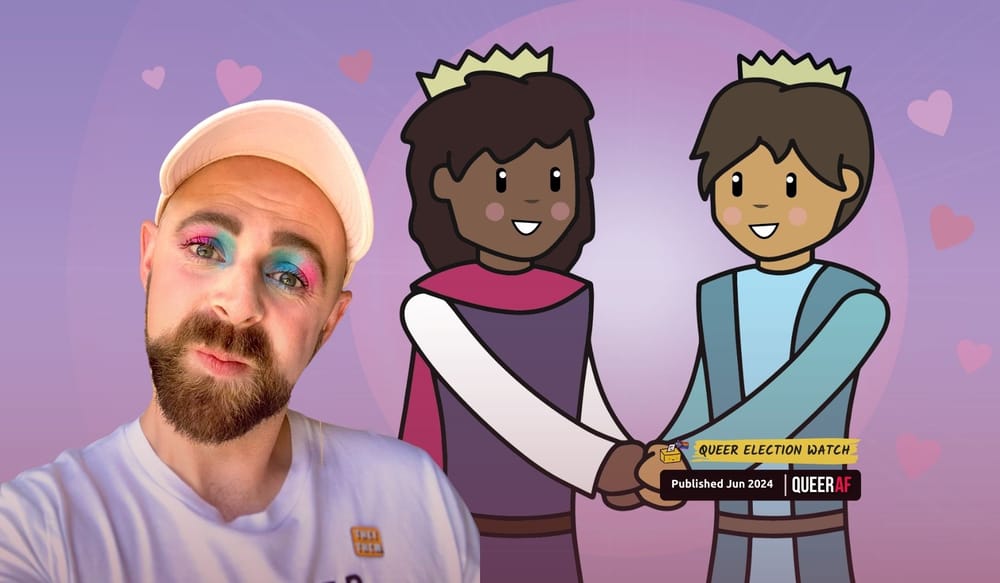
Queer Election Watch: Where do the different political parties stand on conversion practices? Ahead of the UK general election, we dive into what each party has said about this important topic.
What are conversion practices?
Conversion practices (sometimes known as so-called “conversion therapy”) are pseudo-scientific practices that seek to change or suppress a person’s sexual orientation and/or gender identity.
Some conversion practices are faith-based – ranging from exorcisms and prayer vigils to religious counselling. Others are secular – including some mental health professionals that, even while regulated by professional bodies, offer the pseudo psychotherapy psychological “treatment”. There are also conversion practices that are led by family or community members, often acting on behalf of a spiritual or community leader. They all fail to deliver on their purported goal of changing or suppressing a person’s identity.
Conversion practices do not “work”, and there is a significant body of evidence that they cause harm to LGBTQIA+ people. The International Rehabilitation Council for Torture Victims’ Independent Forensic Expert Group has stated that:
“Conversion therapy has no medical or scientific validity. The practice is ineffective, inherently repressive, and is likely to cause individuals significant or severe physical and mental pain and suffering with long-term harmful effects. It is our opinion that conversion therapy constitutes cruel, inhuman, or degrading treatment when it is conducted forcibly or without an individual’s consent and may amount to torture depending on the circumstances, namely the severity of physical and mental pain and suffering inflicted.”
Measuring how common conversion practices are is complicated, as these are stigmatised and hidden experiences. However, the government LGBT survey in 2018 found that just under 3% of LGBTQIA+ people in the UK had been subjected to conversion practices, and 5% had been asked to engage with conversion practitioners.
Conversion practices are used to target vulnerable children and young adults, but this data also demonstrates that the risk of harm is much higher for LGBTQIA+ people of colour and for trans people.
Community surveys with definitions of conversion practices that are wider in scope (capturing practices that are directly driven by family members) find far higher estimates of prevalence. For example, a YouGov survey for Galop in 2023 found that a fifth of LGBTQIA+ people in the UK had experienced some form of conversion practice.
Where do the different political parties stand on banning conversion practices?
🔵 Conservatives
The Conservative Party first committed to introducing a legislative ban on conversion practices six years ago as part of Theresa May’s government’s LGBT Action Plan. Since then, every successive Conservative Prime Minister has recommitted to introducing a ban on conversion practices – most recently in the context of refusing to support Labour MP Lloyd Russell-Moyle’s Private Member’s Bill. However, this commitment has been constantly revisited, with multiple U-Turns under both Boris Johnson and Rishi Sunak’s leadership putting their commitment to the ban under question.
The Conservative party has been in power for six years and has had several legislative periods to introduce a ban. It has not done so. It also had the opportunity to support a private members bill introduced by Lloyd Russell-Moyle, which had cross-party support, but it has not done so.
This is not because banning conversion practices is extremely complex. To date, 16 countries and six regions have banned conversion practices, and globally the movement towards banning the conversion practices is gathering pace.
Over the six years since the LGBT Action Plan was published, there have been clear indications that any ban introduced by the Conservative Party would also likely include such significant limitations it would risk being a ban in name only.
First, at various points, it has been made clear that the party is comfortable banning conversion practices based on sexual orientation but not based on gender identity. This was most evident in a sequence of U-turns by then Prime Minister Boris Johnson, which included announcing the intention to introduce a ban that only protected lesbian, gay and bi people. Any Conservative conversion practices ban would come with a high likelihood of containing weak or no protections for trans people.
Second, the Conservatives have been clear that they will make sure “private prayer” is exempted from any ban. More than half of conversion practices in the UK are faith-based, and many involve one-to-one interactions. This would introduce the risk that a more broadly drafted exception would leave a significant proportion of the LGBTQIA+ people unprotected.
Finally, the Conservatives have consistently supported the idea that it should be possible for adults to “consent” to conversion practices. This would mean that in any situation where a victim of conversion practices had agreed to engage, they would not be protected.
Conversion practices commonly reflect the imposition of strongly held faith and community norms: “consenting” to this form of abuse is not uncommon because of the broader community and cultural pressures applied in these spaces.
Analysis: If re-elected, it is very unlikely that the Conservative party would introduce a conversion practices ban. If another party introduced a bill, the Conservatives would likely seek to amend it to introduce significant and potentially fatal loopholes into the legislation.
🔴 Labour
Labour has a long-term track record of advocating for a ban on conversion practices, and in more recent times, with the party under fire for its lack of commitment to advancing trans rights, it has used its commitment to introduce a trans-inclusive conversion practices ban to reinforce its credentials as an LGBTQIA+ inclusive party.
In January this year, speaking to LGBT Labour, Keir Starmer reiterated that if the Labour Party forms the next government they will “implement a full, trans-inclusive ban on all forms of conversion therapy [and] fully support the view that conversion therapy is psychologically damaging abuse”.
Analysis: As with all policy commitments, it will be important to watch the detail, and how broadly drafted any exemptions are. If elected, it is very likely Labour will introduce an effective, trans inclusive conversion practices ban. Whether they would do this early in their term of office, or delay on the basis that other business is more urgent remains to be seen, particularly as getting the bill through both houses of parliament will require a steady hand and use up a good amount of political capital. Watch out for the inclusion of broad exemptions.
🟡 Liberal Democrats
As with Labour, the Lib Dems have a longstanding commitment to supporting a trans-inclusive ban on conversion practices. They also have a long track record of working on a cross-party basis in support of progressing bills that advance LGBTQIA+ rights, including repealing Section 28 (introduced by a Conservative government in 1988, this infamous law banned local authorities and schools from “the promotion of homosexuality” and was not fully repealed until 2003) and passing the Same Sex Marriage Act. In February this year, Baroness Burt introduced a Private Members Bill in the Lords seeking to ban conversion practices as part of the wider campaign (these bills rarely pass but are an excellent mechanism for securing parliamentary debate and putting pressure on governments to act). This indicates that support of a ban on conversion practices is an active policy priority for the Lib Dems.
Analysis: Post-election, the Lib Dems are likely to support any party bringing forward an effective, trans-inclusive conversion practices ban. Watch out for the inclusion of broad exemptions.
🏴 Scottish National Party
In Westminster, the SNP also has a longstanding commitment to supporting an effective, trans-inclusive ban on conversion practices. In Holyrood, the SNP government has committed to introducing its own ban, making good on their promise to legislate and fill the gap left by the Conservative government’s inaction. The SNP government is currently consulting on the right approach to introducing a ban in Scotland, and whatever the outcome of the next election, there is likely to be a ban on conversion practices in Scotland before legislation makes its way through the Westminster process. However, it will be important to watch out for the influence of the new Deputy First Minister, Kate Forbes. During her unsuccessful leadership campaign, Forbes faltered on LGBTQIA+ rights, including conversion practices, where she made it clear that she believes a ban should allow victims of conversion practices to ‘consent’ to be harmed and that religious communities should have their “right to practice” protected.
Verdict: Post-election, the SNP in Westminster is likely to support any party bringing forward an effective, trans-inclusive conversion practices ban. In Holyrood, they are likely to continue to push for domestic legislation. However, it is too early to say how the Deputy First Minister’s personal views will play into the strength of SNP policy commitment or the nature of any legislation the SNP bring forward.
🟢 Green Party
For two years now, the Green Party has had a clear commitment to an effective trans-inclusive ban on conversion practices, going further than any other party in specifically committing to a ban that protects asexual people (a high-risk group based on government data). In 2022 the party’s Equalities & Diversity Spokesperson Ria Patel said the party would call for a complete conversion therapy ban “including for trans and ace people”, calling the practice “immoral and harmful”.
Verdict: After the election, the Green Party is also likely to support any party bringing forward an effective ban - and they are the only party to have said this should specifically cover asexual people.
Analysis: Why should LGBTQIA+ voters care about what the major parties say about banning conversion practices?
Conversion practices directly harm LGBTQIA+ people in the UK, and some of our communities are at particularly high risk. Currently, most conversion practices remain legal. People can and do openly advertise conversion practices as a service. People can and do charge money for harming LGBTQIA+ people in this way. Allowing conversion practices to remain legal means allowing future generations of LGBTQIA+ people to suffer.
In addition to this, at a broader societal level, allowing conversion practices to remain legal perpetuates the idea that being LGBTQIA+ is something that should be “cured” or changed. Put simply, conversion practices are the practical application of homophobia, biphobia, transphobia and acephobia.
Stay tuned to Queer Election Watch for more on the issues that matter to you. Wondering how to place your vote in the upcoming general election? Here's everything you need to know about making your voice heard on voting day.











